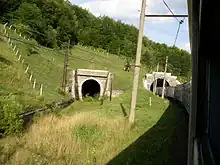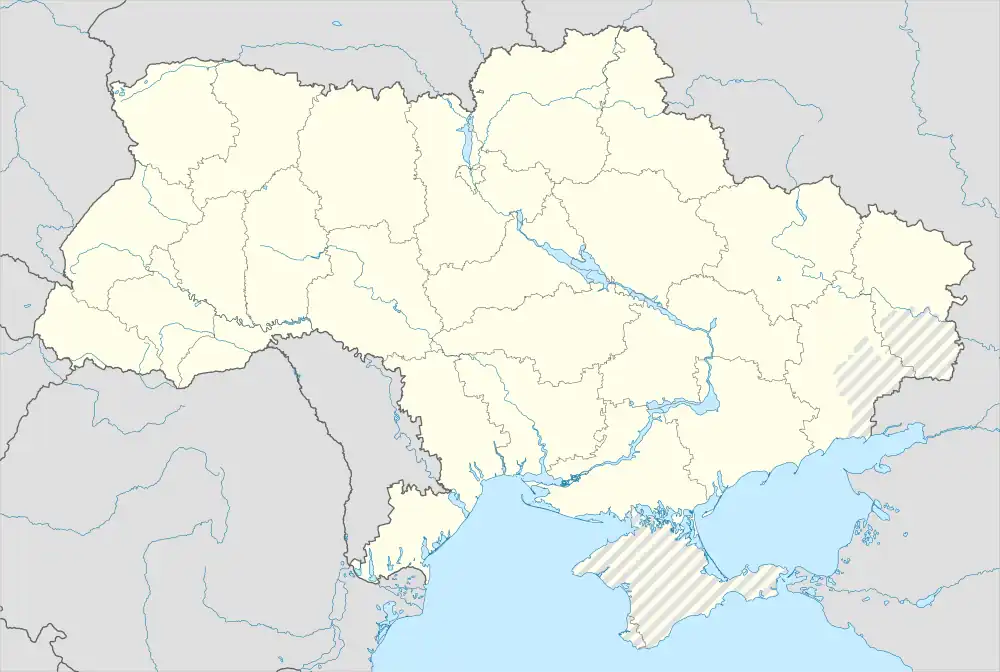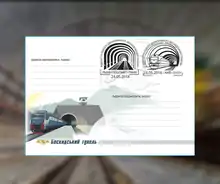Beskydy Tunnel
The Beskydy Tunnel (Ukrainian: Бескидський тунель) is a railway tunnel of the Lviv Railways between the towns of Beskid and Skotarske and passes through the Carpathian Mountains under the Volovets Pass. As the second-longest tunnel in the Ukrainian rail network, it's part of Europe's Corridor V (Italy-Slovenia-Hungary-Slovakia-Ukraine), thus linking Lviv in western Ukraine to cities such as Venice and Trieste in northern Italy, as well as various other locations along the route in Slovenia and Hungary.
 Two portals with the old one overgrown | |
 | |
| Overview | |
|---|---|
| Status | Active |
| Crosses | Carpathian Mountains |
| Operation | |
| Opened |
|
| Technical | |
| Line length | 1,822 m (5,978 ft) (new tunnel) 1,750 m (5,740 ft) (old tunnel) |
| Track gauge | 1,520 mm (4 ft 11+27⁄32 in) Russian gauge |

History
The first Beskydy Tunnel, built in 1886, was 1,750 m (5,740 ft) long. In time, its capacity no longer met increasing demand, thus it was decided to make a new bore parallel to the existing one. Discussions began in 1998 and construction started in 2014,[1] using the New Austrian Tunneling Method. Breakthrough was achieved in January 2016[2] and it was inaugurated in a ceremony by Ukrainian President Petro Poroshenko in late May 2018.[3][4]
The new tunnel has a length of 1,822 meters and is covered by up to 180 meters of rock. The internal dimensions of 8.5 meters height and 10.5 meters width allows for a double track railway to be accommodated. The two tubes are connected by three lugs, while the old tunnel is being used as a rescue route for the new one.
The maximum speed was increased from 40 km/h to 70 km/h. As a result, the tunnel can now handle 50 to 100 trains daily, nearly 60% of all rail traffic between Ukraine and the European Union,[3] and it will reduce journey times between Lviv and Ukrainian border town Chop, in a bid to facilitate exports of domestic products to neighbouring countries.[3]
The project was financed by the European Bank for Reconstruction and Development (EBRD) and the European Investment Bank (EIB); the EBRD invested $40 million, while the EIB contributed €55 million ($64.5 million) for construction.[3] In addition to providing financing, technical expertise was bought in from the EU, especially from Austria, to support the development of the tunnel. The construction process reportedly required 130,000 tonnes of concrete and 8,000 tonnes of steel.[3]

2022 Russian attack
On the night of 1-2 June 2022, Russia targeted a section of the tunnel with at least two Kalibr cruise missiles to disrupt weapon and fuel supplies from the West to Ukraine during the 2022 Russian invasion of Ukraine. The attack was confirmed by governor of Lviv Oblast Maksym Kozytskyy.[5]
References
- "Week's balance: New tunnel to Europe, anti-corruption court's final stretch, and Russia sanctions". UNIAN. 27 May 2018.
- Beskidy tunnel through Carpathians will be opened this year – Omelyan (Бескидський тунель крізь Карпати відкриють в цьому році – Омелян). Zakarpattia online, 20 April 2017.
- "Ukraine launches Beskyd railway tunnel." railway-technology.com, 25 May 2018.
- "Beskyd tunnel completed". Railway Gazette. 25 May 2018.
- "Russia 'strikes Ukraine tunnel on border to stop weapon supplies to Kyiv'". mirror.co.uk. 2 June 2022.